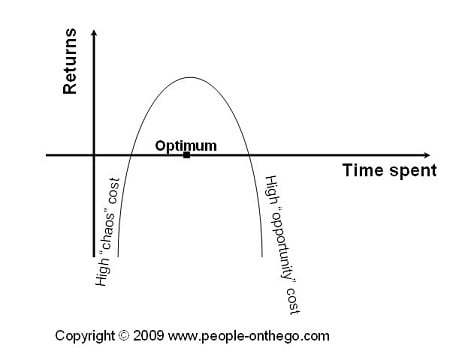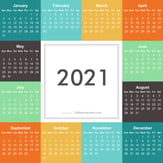It seems that many of the people we talk to fall in one of these two categories. Either they spend too much time on organizing (these are the persistent few) or they have largely given up on organization (the more common scenario) and they feel out of control most of the time. Is there however an optimum amount of organization that would be feasible for most of us and yet give us the best return?
This graph, which resembles to some degree the Results Curve(tm) graph that I have been teaching in our Accomplishing More With Less workshop and workbook, describes the returns that we get from the time spent on organization, and below are some related note:

- There is a minimum amount of organization that we all need, and without it, our lives are likely to be chaotic, stressful, and unfulfilled.
- The minimum amount of organization is a lot less than what you might think, and if done strategically, it is likely to bring big returns.
- There is an optimum amount of organization that if we go beyond it, we would be doing so at the expense of more important activities and therefore incur a very high opportunity cost.
- Both lack of organization as well as organizing beyond the optimum point are equally disadvantageous. While Eric Abrahamson and David H. Freedman, authors of A Perfect Mess, suggest that disorder is far more advantageous than order (and that most organizational systems are a waste of time), I wouldn't go that far. I promote an optimum level or organization which I also believe is different for each person.
Your to-do's
- Reflect on where you are on the organizational curve above and find out where you are on this scale.
- If you think you are under-organized, identify an area where some additional organization would give you high returns and act on it.
- If you think you are over-organized at the expense of more important initiative and activities, identify an area where you can reduce your effort and make room for more strategic things.
- Keep an eye on organizational tips and see what might work for you. Subscribe to this blog and to similar ones and contribute your comments and get engaged!








